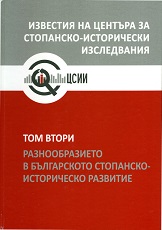Търговците в Учредителното народно събрание 1879 г. Опит за социално-политически портрет
The Merchants in the Constitutional National Assembly from 1879. A Socio-political Portrait
Author(s): Milko PalangurskiSubject(s): History, Economy, Economic history, Modern Age
Published by: Център за стопанско-исторически изследвания
Keywords: traders; constitution; political experience; local self-government; independent church; revolutionary struggles
Summary/Abstract: In 1879, after the Liberation of Bulgaria, the Constituent National Assembly was convened to elaborate the constitution of the country.Among the 230 delegate 97 are tradesman, which makes 42.20% of the assembled. This makes retailers the largest professional group in the constitutional assembly. The traders taking part in the University of National and World Economy are people with a solid education for the time being. It is by no means elitist, but it is at a level that allows them to occupy key positions in the social life of the Bulgarian society – ecclesiastical-national municipalities, church activities, creation and development of educational institutions and their modernization and Europeanization. Their role in creating the Libraries Network,publishing and distributing books and textbooks and maintaining the national newspaper network is enormous. They have gained some political experience in the Ottoman Empire, as logically this happens in the three main spheres – local self-government, which is the result of the reform of the Empire, the struggle for a national church – a movement that engages all intelligent forces and third, through participation, financing, and influencing the revolutionary flow. Without being a driving force in the debates at the Constituent Assembly, they occupy positions that sets the tone for the liberal model of governance imposed for the next seven decades.
Journal: Известия на Центъра за стопанско-исторически изследвания
- Issue Year: II/2017
- Issue No: 1
- Page Range: 92-102
- Page Count: 11
- Language: Bulgarian

